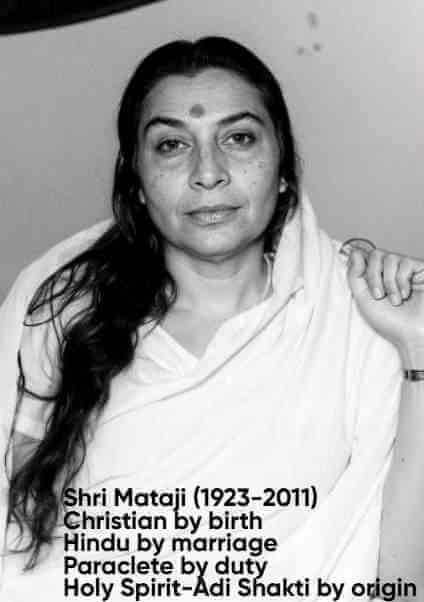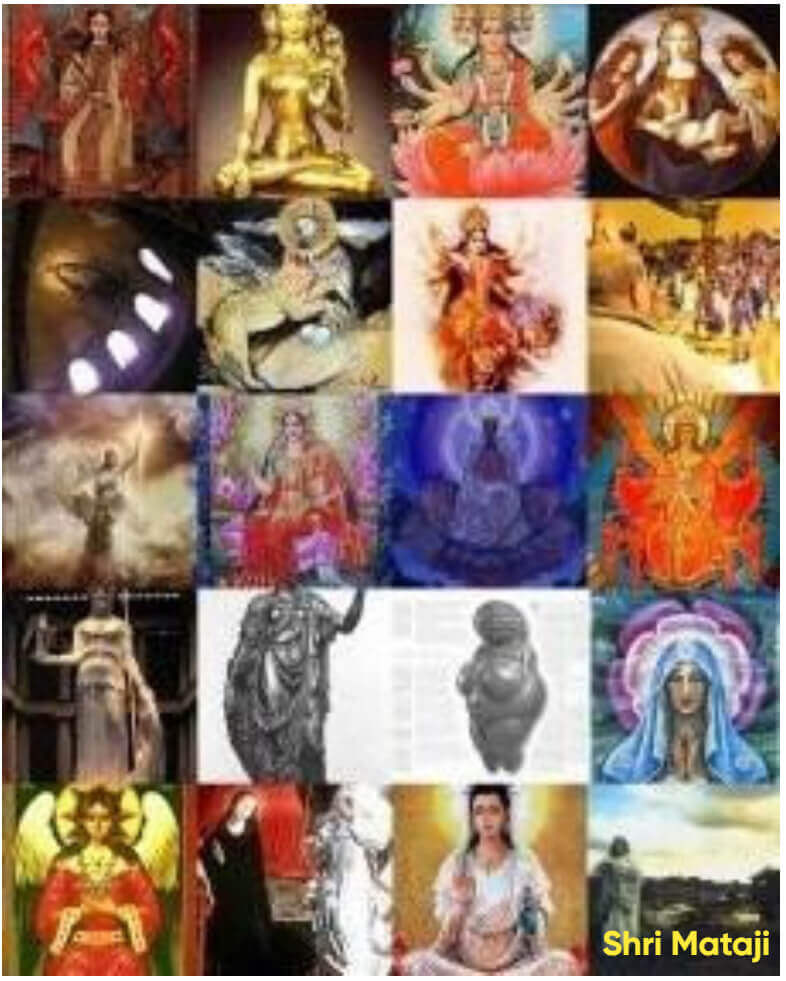The truths espoused in Christianity are appearing to me the same truths that are taught in Hinduism or Buddhism.
Thoshi Takeuchi
It is very interesting, because I was initially driven away from Christianity because of the dogma that you must put your faith in God/Jesus before you will be shown the way. However, the Eastern tradition is different. In the Kena Upanishads, it states very clearly that only way to experience the true power, God (Brahman), is to experience the realization firsthand. However, one important difference in the text is that that the way toward this realization is meditation. Thus you will experience the nature of reality and Truth through the practice of meditation. This idea is much more appealing to my scientific train of thought, rather than the dogma that faith must come before the experience. It does not say that I must believe in something to find Truth. It says that you must practice (meditation) in order to find the Truth.
Thoshi Takeuchi
Thoshi Takeuchi's Upanishads
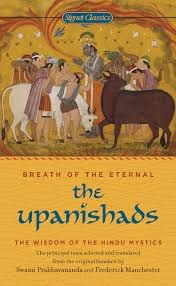 "The Upanishads may seem somewhat more difficult to grasp compared
with the Dhammapada. At least they are certainly more difficult for
me to understand. Unlike the Dhammapada, which outlines a philosophy
and practice, the Upanishads describe experiences and realizations by
a number of ancient sages (gurus). The goal of the text may be to
help the reader in the path towards spiritual enlightenment by
describing many of the experiences along the way.
"The Upanishads may seem somewhat more difficult to grasp compared
with the Dhammapada. At least they are certainly more difficult for
me to understand. Unlike the Dhammapada, which outlines a philosophy
and practice, the Upanishads describe experiences and realizations by
a number of ancient sages (gurus). The goal of the text may be to
help the reader in the path towards spiritual enlightenment by
describing many of the experiences along the way.
The way I have approached these texts is to read them and obtain
understanding of these works at whatever level I can. Some parts make
sense, while other aspects do not make sense to me. However, I found
that when I reread the texts at a later time, I can appreciate and
understand more because of the experiences I have gained in the
intervening time.
I think the way NOT to approach these texts is overanalyzing or
trying to obtain logically consistent ideas (because they were
written by many people). Similarly I would not take the opposite
approach and believe and follow everything in the texts without a
basis of personal experience to help back up the teachings. The
experience is an essential part of the understanding...
The Kena Upanishad
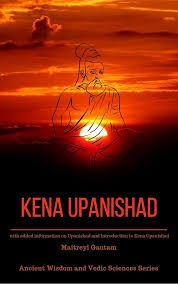 The Kena Upanishad addresses some of the deepest questions of
spirituality and mankind. What is life? What is thought? What is
consciousness? What does any of this have to do with religion,
spirituality or philosophy? In this Upanishad, the dialogue occurs
between a student and a teacher. The student wonders for example,
"Who makes my mind think? Who fills my body with vitality?”The
answer to these questions as explained by the teacher is that our
Self is that part of us that IS.
The Kena Upanishad addresses some of the deepest questions of
spirituality and mankind. What is life? What is thought? What is
consciousness? What does any of this have to do with religion,
spirituality or philosophy? In this Upanishad, the dialogue occurs
between a student and a teacher. The student wonders for example,
"Who makes my mind think? Who fills my body with vitality?”The
answer to these questions as explained by the teacher is that our
Self is that part of us that IS.
The Self cannot be seen, heard, smelt, tasted, or touched. The Self
cannot be known by the intellect or understood by the mind. It is a
strange paradox that we may want to understand our true Self, but the
Self is so difficult to find.”There is only one way to know the
Self, and that is to realize him yourself.”
The question that may arise in our mind is, what is this"Self", and
why would we want to strive to realize it? The first aspect is that
deep driving quest for Truth within all of us. If by achieving and
realizing the Self, we achieve awareness of reality, then that in
itself is a wonderful quest! The second point is that by
understanding ourselves, we go beyond the cycle of birth and death.
Birth and death are meaningless when we are in contact with Reality.
Thus the Kena Upanishad is not wonderful for the practicality as with
the Dhammapada but is wonderful because it inspires the seeker by
acknowledging the quest for Truth and pushes us to desire to achieve
this Truth.
The second part of the Kena Upanishad describes a story where the
gods defeated the demons, but these gods (Agni, god of fire; Vayu,
god of air; and Indra, leader of gods) got arrogant and decided that
the power of Good was theirs and that power and glory were theirs
alone. Thus the true spirit and power (Brahman) taught these gods a
lesson. Brahman showed them that the true power comes from the power
of the Self, and not from the gods themselves.
It is the power of Brahman that makes
The mind to think, desire, and will.
Therefore
Use this power to meditate on Brahman.
He is the inmost Self of everyone;
He alone is worthy of all our love.
Meditate upon him in all. Those who
Meditate upon him are dear to us all.
This passage raises a very interesting point about Hinduism. Although
Hinduism is a pantheistic religion with multiple gods, everything and
everyone (including all of us) receives their power from our true
Self, that which is Brahman. From this sense, the Brahman, the Self,
is the true God, while the other gods are simply manifestations of
the Self in lesser forms.”Agni, Vayu, Indra?these three excel Among
the gods because they realized Brahman.”
The Upanishad ends:
Those who realize Brahman shall conquer
All evil and attain the supreme state.
Truly they shall attain the supreme state!
These statements are extremely interesting because they say that the
power of the gods (and all of us) are derived from the Self, the
Brahman. The ability of the gods Agni, Vayu, and Indra to be powerful
and defeat the demons was because these gods excel in the
understanding of our true Self. The corollary to these statements is
that if we can find our true Self, then we will be in contact with
what gives the power to the gods, and therefore we can"conquer all
evil.”
I will state this again, because it is so important:
If we can find our true Self, then we will be in contact with what
gives the power to the gods, and therefore we can "conquer all evil."
This statement might be interesting to some as an ego trip or as a
power boost. However, that is not the idea behind this Upanishad.
Agni, Vayu, and Indra were taught a lesson because of their power
trip. The idea behind this principle lies in the power of inspiration
and renunciation. We are honored when we truly understand our
relationship to the Universe and attain power, not as an individual
entity, but as part of the greater whole.This realization of Truth is
the goal, and through understanding this Truth, we can understand and
overcome any obstacles. I personally find this idea inspiring, and
appears to have many similarities to Christian ideas and principles.
(I am the way)
It is very interesting, because I was initially driven away from
Christianity because of the dogma that you must put your faith in
God/Jesus before you will be shown the way. However, the Eastern
tradition is different. In the Kena Upanishads, it states very
clearly that only way to experience the true power, God (Brahman), is
to experience the realization firsthand. However, one important
difference in the text is that that the way toward this realization
is meditation. Thus you will experience the nature of reality and
Truth through the practice of meditation. This idea is much more
appealing to my scientific train of thought, rather than the dogma
that faith must come before the experience. It does not say that I
must believe in something to find Truth. It says that you must
practice (meditation) in order to find the Truth.
However, now that I have practiced meditation for many years, I find
that I am becoming more devotional and spiritual. The truths espoused
in Christianity are appearing to me the same truths that are taught
in Hinduism or Buddhism. Thus, I will say to those seekers on the
path of meditation, continue with the meditation and see how your
view of reality changes with time. Do not deny your rational and
skeptical thought (I cannot, after all, I am a scientist :-);
however, at the same time, keep an open mind.”
Toshi Takeuchi
The Universal Harmony of Spiritual Truths: An Examination of Thoshi Takeuchi’s Realization in Light of Shri Mataji's Revelations
The mind to think, desire, and will.
Therefore
Use this power to meditate on Brahman.
He is the inmost Self of everyone;
He alone is worthy of all our love.
Meditate upon him in all. Those who
Meditate upon him are dear to us all.
All evil and attain the supreme state.
Truly they shall attain the supreme state!
In the quiet space between science and spirit, Thoshi Takeuchi found resonance. Christianity’s call to faith met the Upanishadic path of realization. Through meditation, he touched the Self—Brahman—beyond dogma, beyond intellect. The truths of East and West converged not in belief, but in experience. And in that experience, the power of the gods, the wisdom of sages, and the love of Christ became one. Thoshi Takeuchi discovers that the truths of Christianity, Hinduism, and Buddhism converge through meditation and realization of the Self—Brahman as the source of divine power.
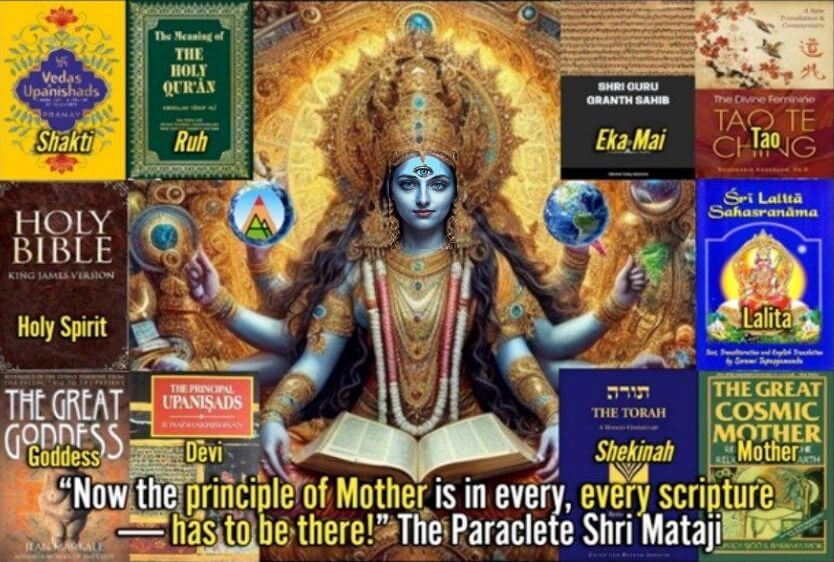
“Now the principle of Mother is in every, every scripture--has to be there.” The Paraclete Shri Mataji, Kazu Radio Interview in Santa Cruz, United States, October 1, 1983
“I meditate on all those who meditate on Me.” The MahaDevi, Sahasrara Chakra, Montreal, Quebec, Canada, June 27, 1994
Abstract
This paper explores the profound statement of Thoshi Takeuchi: “The truths espoused in Christianity are appearing to me the same truths that are taught in Hinduism or Buddhism.” We will analyze this declaration within the framework of perennial philosophy, which posits that a single, universal truth underlies all major religious and spiritual traditions. This analysis is further enriched by the revelations of the Paraclete Shri Mataji, who on October 1, 1983, in a Kazu Radio Interview in Santa Cruz, United States, declared: “Now the principle of Mother is in every, every scripture--has to be there.” This paper will demonstrate that a comprehensive comparison of religions and spiritual teachers confirms Takeuchi’s profound statement. Furthermore, we will explore how his belief that “Thus you will experience the nature of reality and Truth through the practice of meditation” is directly addressed by the Divine Mother’s revelation on June 27, 1994: “I meditate on all those who meditate on Me.” This declaration offers a direct, dogma-free path to the nature of reality and truth. This paper concludes by directing seekers to the vast resources available at www.adishakti.org and encouraging an inward journey to discover the eternal truths that reside within.
Introduction
In the ever-expanding discourse on spirituality and comparative religion, certain insights emerge that challenge the perceived boundaries between different faiths. One such profound observation comes from Thoshi Takeuchi, a scientist who, through the practice of meditation, came to the realization that “The truths espoused in Christianity are appearing to me the same truths that are taught in Hinduism or Buddhism.”[1] This statement, born from personal experience rather than academic study, resonates deeply with the principles of perennial philosophy, which posits that a single, universal truth is the common source of all major religious and spiritual traditions. This paper will explore the depth and significance of Takeuchi’s realization, demonstrating its alignment with a broader understanding of universal spirituality. We will argue that his experiential discovery is not an isolated insight but rather a confirmation of a universal reality, a reality that has been further illuminated by the teachings of the Paracaclete Shri Mataji.
Thoshi Takeuchi’s Journey: From Scientific Skepticism to Universal Realization
Thoshi Takeuchi’s spiritual journey is a compelling testament to the power of direct experience in transcending religious dogma. As a scientist, Takeuchi was initially repelled by the Christian doctrine that demanded faith as a prerequisite for spiritual understanding. He articulated his position clearly:
This prerequisite of faith before experience was at odds with his scientific mindset, which valued empirical evidence and firsthand observation.
In contrast, Takeuchi found the Eastern traditions, particularly as expressed in the Kena Upanishads, to be more intellectually and spiritually accessible. The Upanishadic approach, which emphasizes meditation as the means to “experience the true power, God (Brahman),... firsthand,” resonated with his scientific training. This path did not demand blind faith but rather encouraged a dedicated practice to discover the truth for oneself. Takeuchi’s embrace of meditation was not a rejection of his rational mind but an extension of it—a method to explore the inner world with the same rigor he applied to the external world. His belief that “you will experience the nature of reality and Truth through the practice of meditation” became the guiding principle of his spiritual quest.[1]
Through years of dedicated meditation, Takeuchi’s perspective evolved. He did not abandon his rational and skeptical intellect, but he did open his mind to a deeper, more devotional and spiritual reality. It was through this sustained practice that he arrived at his profound realization:
This was not a conclusion reached through intellectual study alone, but a deep, inner knowing that emerged from his direct experience of the universal truths that lie at the heart of all great religions.
The Revelations of the Paraclete Shri Mataji: A Universal Framework
Thoshi Takeuchi's experiential discovery of universal truths finds a profound theological and spiritual framework in the revelations of the Paraclete Shri Mataji. Her teachings, delivered over several decades, provide a comprehensive understanding of the divine unity that underlies all religious traditions. Two specific declarations are particularly relevant to Takeuchi’s realization.
First, in a Kazu Radio Interview in Santa Cruz, United States, on October 1, 1983, the Paraclete Shri Mataji made a powerful and unequivocal statement about the universal presence of the Divine Feminine:
This declaration provides the foundational principle for understanding the shared truths across different religions. The “principle of Mother,” the creative and nurturing power of the universe, is not the exclusive domain of any single tradition but is a universal presence, a common thread woven into the fabric of all sacred texts. This revelation directly supports Takeuchi’s observation by providing a theological basis for the similarities he discovered between Christianity, Hinduism, and Buddhism. The universal truths he experienced are manifestations of this universal Mother principle.
Second, on June 27, 1994, the Divine Mother revealed a profound truth about the nature of meditation and the seeker’s relationship with the divine:
This statement directly addresses Takeuchi’s chosen path of meditation and his belief that through this practice, one can “experience the nature of reality and Truth.” It transforms the act of meditation from a solitary practice into a reciprocal relationship with the Divine. The seeker is not merely striving to reach a distant goal but is actively being met by the divine presence. This revelation offers a direct, dogma-free, and deeply personal path to spiritual realization, a path that is open to all who sincerely seek the truth within themselves.
The Convergence of Science, Spirituality, and Perennial Philosophy
The convergence of Thoshi Takeuchi’s scientific mindset with his spiritual realization offers a powerful model for the modern seeker. His journey demonstrates that a rational, evidence-based approach is not incompatible with a deep and meaningful spiritual life. In fact, for Takeuchi, it was his commitment to experiential verification that led him to the universal truths that transcend any single religious tradition. This approach is a powerful antidote to the perceived conflict between science and religion, suggesting that the two can be complementary paths to understanding the nature of reality.
Takeuchi’s discovery aligns perfectly with the tenets of perennial philosophy, a perspective that has been articulated by numerous scholars and mystics throughout history. Perennial philosophy posits that a single, universal truth is the common source of all major religious and spiritual traditions. The outer forms and rituals of these traditions may differ, but at their mystical core, they all point to the same ultimate reality. The comprehensive comparison of religions and gurus confirms this profound statement of Takeuchi. The teachings of Christ, the wisdom of the Upanishads, and the insights of the Buddha all spring from the same well of universal truth. Takeuchi’s realization is a modern-day testament to this ancient wisdom.
The Paraclete Shri Mataji’s declaration that the “principle of Mother is in every, every scripture” provides the key to unlocking this universal truth. It is the divine feminine, the creative and nurturing power of the universe, that is the common denominator in all spiritual traditions. Whether referred to as the Holy Spirit in Christianity, Shakti in Hinduism, or Prajnaparamita in Buddhism, the Mother principle is the source of all creation and the wellspring of all spiritual wisdom. Her presence in every scripture is the reason why the truths espoused in these seemingly disparate traditions are, in fact, one and the same.
Conclusion: The Path to Universal Truth
Thoshi Takeuchi’s profound statement, “The truths espoused in Christianity are appearing to me the same truths that are taught in Hinduism or Buddhism,” is more than just a personal opinion; it is a powerful affirmation of a universal reality. His journey from scientific skepticism to spiritual realization through the practice of meditation provides a compelling roadmap for the modern seeker. It is a journey that honors the rational mind while simultaneously opening the heart to the mysteries of the divine.
The revelations of the Paraclete Shri Mataji provide the theological and spiritual framework for understanding Takeuchi’s realization. Her declaration that the “principle of Mother is in every, every scripture” unveils the universal foundation of all religious traditions, while her assurance that “I meditate on all those who meditate on Me” offers a direct and personal path to experiencing that truth. Together, these revelations confirm that the unity of religious experience is not a matter of intellectual synthesis but of direct, inner connection with the divine.
This convergence of experiential discovery, theological revelation, and perennial philosophy points to a singular conclusion: the nature of reality and truth is not a secret held by any one religion or tradition, but a universal birthright accessible to all who sincerely seek it. The path to this realization is not through dogma, ritual, or indoctrination, but through the simple and profound practice of meditation, a journey inward to the source of all being.
For all who are looking for that reality and truth, the journey begins now. The resources gathered and presented on the website www.adishakti.org offer a comprehensive guide for this spiritual quest. But the ultimate destination is not an external website or a book; it is the kingdom of God that resides within each of us. The Divine Mother, the Paraclete, resides within, and it is there that the ultimate truth is to be found. This is a spiritual quest like no other, a journey of immortality and eternity, a journey of going Home one day.
References
[1] Takeuchi, Thoshi. "The truths espoused in Christianity are appearing to me the same truths that are taught in Hinduism or Buddhism." adishakti.org.[2] Shri Mataji Nirmala Devi. "Across the crowd, I suddenly caught a glimpse of His mother, Mary." Kazu Radio Interview, Santa Cruz, USA, 1 Oct. 1983.
[3] Shri Mataji Nirmala Devi. "Shri Mataji, On Whom Do You Meditate?" Montreal, 27 June 1994.
Related articles:
The Gospel of John in the Light of Indian MysticismOn admiring the religious other
Jesus never himself speaks of himself as God
Thomas purports that Jesus was an exemplar of God
Public life of Jesus
Thoshi Takeuchi: "The truths espoused in Christianity are ...”
Most worthwhile life is spent discovering your spiritual core
The Resurrection of Christ within You
"Knowledge of God's Son obtained through Holy Spirit.”
Jesus' connection with India through "Wise men from east"
The Unknown Years of Jesus' Life—Sojourn in India
Jesus through Sikh eyes
Jesus through Hindu eyes
Christ the Yogi: A Hindu Reflection on The Gospel of John
Great message of Jesus living and thriving in East and West
Who is Jesus? He's three people, says Deepak Chopra
The Third Jesus
Who Is Deepak Chopra's"Third Jesus"?
Deepak Chopra: Is Jesus Coming Back?
The Third Jesus - Book review by Frederic and Mary Brussat
Deepak Chopra and The Third Jesus
Carlsbad provides different take on Jesus in new book
Book Review: "The Third Jesus"by Deepak Chopra
The Third Jesus: The salvation offered by Jesus
The Third Jesus: The Kingdom of God is within
The Mysteries of the Kingdom
The Primordial Light, the Father in Heaven in the inner world
Deepak Chopra: "Jesus belongs to the world.”
The Third Jesus: The Christ We Cannot Ignore
"Truly, truly, I say to you, before Abraham was born, I am.”

